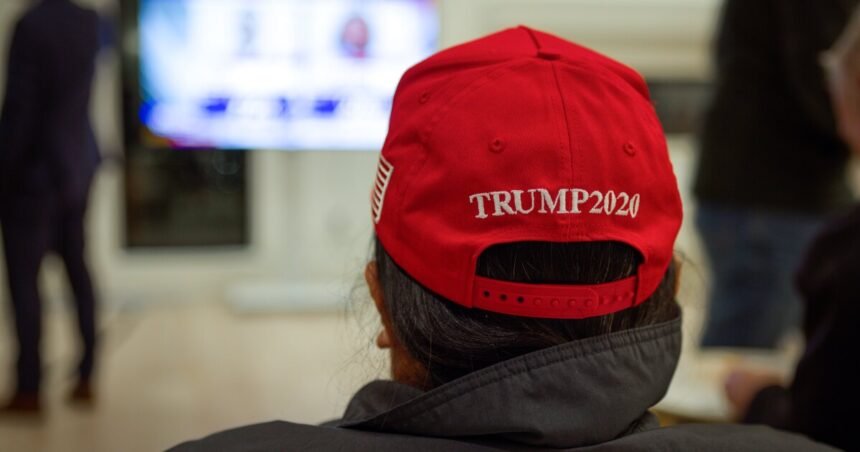Latino voters in Utah split evenly between President-elect Donald Trump and Vice President Kamala Harris, according to data from the Associated Press. For those who voted for Trump, the economy and immigration were key issues — just as they were for voters across the country.
Roughly 15% of Utah’s population, and 10% of its eligible voters, are Hispanic or Latino according to 2022 census data. As a whole in this election, they leaned slightly more toward Trump than Latinos across the country, 49% here compared to 43% nationwide.
“In a predominantly Republican state, predominantly Republican neighborhood or city, if they’re [members of The Church of Jesus Christ of Latter-day Saints], there’s a fair chance that they’re receiving messages to vote Republican,” said Claudio Holzner, chair of the political science department at the University of Utah. “So Latinos in Utah may be more Republican than Latinos nationally.”
Holzner doesn’t think these voters have left the Democratic Party permanently but said high costs for groceries and housing may have driven their choice.
People of color are more likely than non-Hispanic whites to be living in poverty in Utah.
“If you’re unhappy with the economy, you voted for Trump,” he said. “And I don’t think it matters whether you’re Latino or white or female or care about abortion. I think it was a pocketbook election.”
Arturo Morales-LLan, former chairman of the Utah Republican Latino Coalition, came to the United States from Mexico in the early 90s for college. He supported Trump in hopes of a better economy.
“I believe there’s going to be more liquidity in the market, and the people will be more willing to invest and take risks, and that is going to help improve the economy.”
There’s new excitement about Trump’s return to office, Morales-LLan said, from the stock market to the Trump dance.
The current chair of the coalition, Hamilton Ruiz, also came to the U.S. from Mexico. He joined The Church of Jesus Christ of Latter-day Saints and the military before graduating from the University of Utah.
In a state like Utah, religion is omnipresent.
“Hispanics have very strong religious bases and they don’t believe in abortion. They don’t believe in so many other things that are happening right now in the country,” Ruiz said, alluding to “diversity in males, females, and the new groups that are coming out.”
While the debate over transgender rights was a galvanizing force for Trump voters nationally, and in Utah, what Ruiz said the coalition is concerned with is how the federal government spends its money.
“We have a few natural disasters, and a lot of that money is gone,” he said. “So what’s going on with the money that we have for those undocumented people coming in?”
On immigration, Morales-LLan is worried about drugs like fentanyl coming across the border, which he said affects low-income people, including many Hispanics, the most.
During a Border Security and Enforcement Subcommittee hearing in 2023, Illinois Democratic Rep. Delia Ramirez asked James Mandryck, deputy assistant commissioner with the Office of Intelligence under U.S. Customs and Border Protection, if migrants entering the U.S. on foot make up a very small percentage of people trafficking opioids. Mandryck said yes. Both Customs and Border Protection and the Drug Enforcement Administration see Asia, specifically China, as the primary source of fentanyl that is eventually smuggled over the southern U.S. border.
Morales-LLan expects Trump to crack down on the border right away.
“I wouldn’t be surprised if, as he is giving his speech on the Capitol, on the day he takes office — I wouldn’t be surprised if he gives the executive order right from there to secure the border.”
Ruiz agrees that the border needs to be controlled, but he doesn’t think Trump will carry out his promise of mass deportations. He sees Trump as a businessman and that promise as a negotiation tactic.
“Is it feasible to grab all the undocumented people in the United States and take them out of the country? It will be costly, it will be ineffective because, obviously, our economy [thrives] on the back of a few of those immigrants.”
Instead, Ruiz sees talk of mass deportations as a warning.
“I think he [Trump] wants to make sure that people get the message that if you’re not here doing what you’re supposed to do, or if you’re not here legally, and you’re not helping or promoting our country, then yeah, you need to find a way out,” he said.
Some people who have easy access to the country take it for granted, Ruiz said, and he wants every Latino who enters the U.S. to do so legally. Despite the anti-immigrant rhetoric, Ruiz saw Trump as the better of two options.
“He does have a few comments that can be very degrading,” he noted. “We take the best out of it and we leave the worst.”
Macy Lipkin is a Report for America corps member who reports for KUER in northern Utah.











